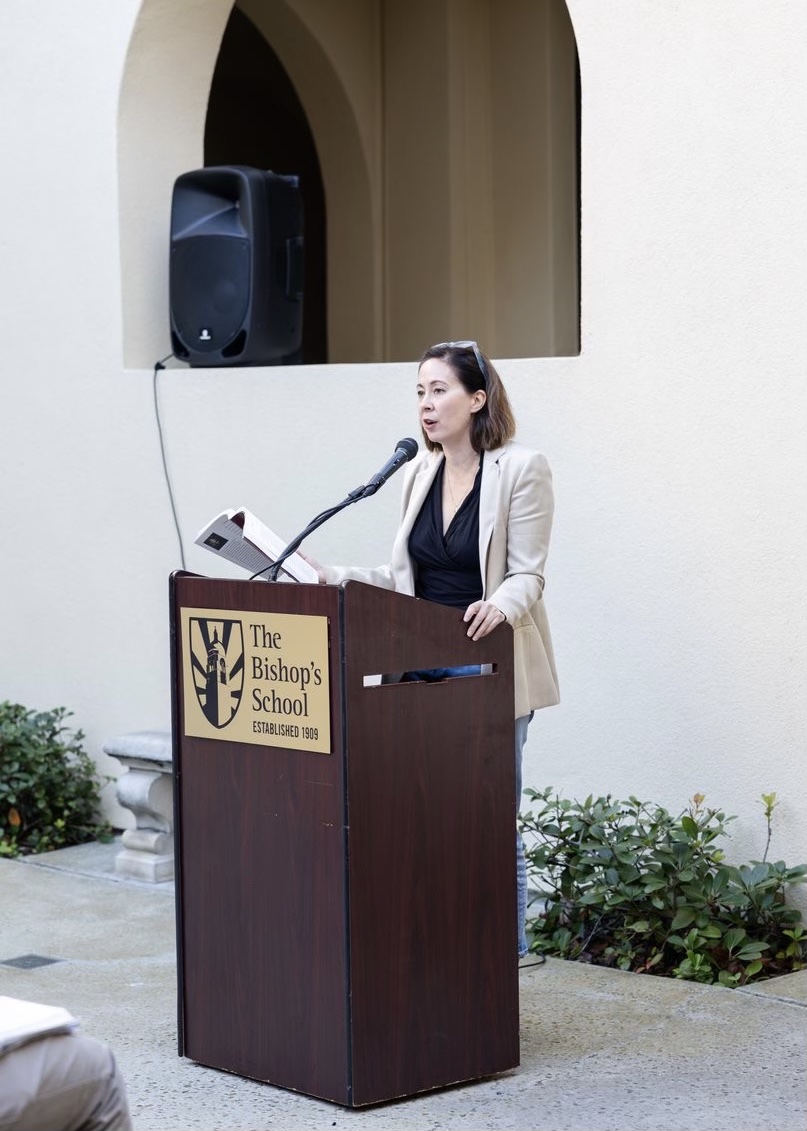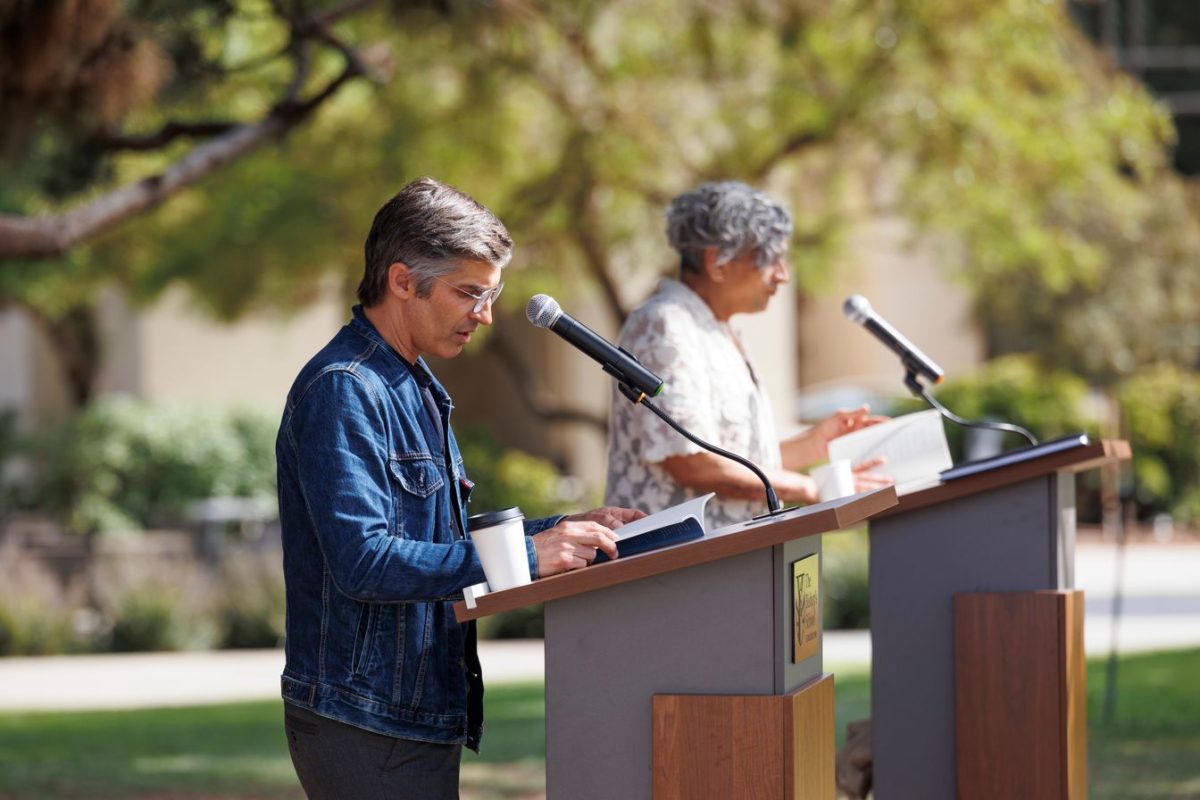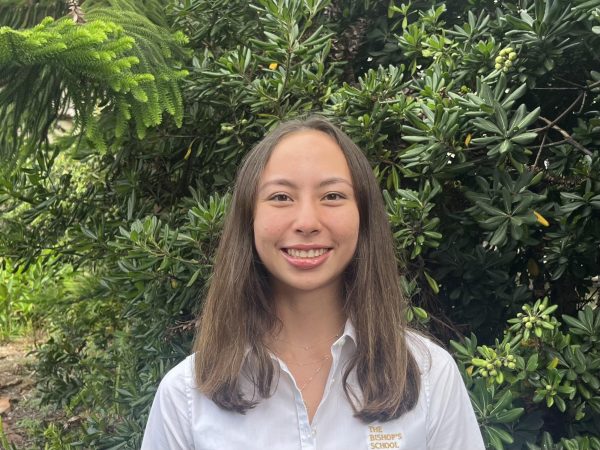“This is a book trying at a translation and failing…something is always left out,” said award-winning poet Paisley Rekdal to the Period 3 Honors Writing class on November 7. “It’s a carefully cultivated loss.”
Rekdal is Poet Laureate of Utah, meaning she is appointed to compose poems for special events and occasions. She recently published a collection of poems called West: A Translation about the history of the transcontinental railroad, commemorating its 25th anniversary. As this year’s Robert Mulgrew Poetry Series guest, she came to Bishop’s to read her work and answer questions in English classes on November 6 and 7.
West: A Translation grapples with themes of intersecting cultures, immigration, translation, and division in American history. The book is unique in its form, with “lyrical essays” in the back that provide background for each poem. In her conversations with students, she provided insight into this choice. “She said the essays were a justification for writing the book, because the information there isn’t provided in her poems or on the website,” Joy Udinsky (‘24), who is in Honors Writing, recalled.
Rekdal also explained the process of how her book came to be. The back cover states that she was commissioned to write about the railroad for its 25th anniversary. “We know that information, but hearing more about the personal considerations behind it was really cool,” Joy said. Rekdal explained that she was expected to write a positive reflection of the railroad, so she was surprised by the positive feedback she received when many of her poems did the opposite in describing stories of discrimination, labor, and loss.
The book is a balancing act between art and history, and Rekdal described the ways she worked with this balance. “The amount of research I did, which is a lot, is not all-encompassing,” she told the Honors Writing class, explaining that she could write a whole other book about Native Americans, for example. “I made a conscious choice to not go into all these areas, and instead scratch the surface of almost everybody’s story,” she said.
Sabrina Li (‘24), whose Advanced Honors English class got to meet with Rekdal as well, was particularly interested in this aspect. “It was cool to hear when there wasn’t a lot of source material on something she could go more into imagination, almost as an art form,” she said. “And then if there was a lot of information available, she seemed more comfortable with twisting it, because she could go back and reference it.”
As Rekdal put it, “poetry reveals what history tries to hide.” Joy said this stuck with her. “I never thought about it that way before,” she reflected.
Something that surprised many students was the way Rekdal read her poetry, specifically her poem “Dead,” which she opened the November 6 reading with. She read it at a rapid, rhythmic pace and a low tone. “That rhythm of the train, I really didn’t get by just reading the poem in the book,” said Sabrina. “So that was really interesting, getting to hear the choices for how she meant everything to sound.”
Hearing a writer’s intentions behind their work firsthand was a new experience for many students. “She talked about how when you publish something, it’s usually up to the reader to interpret what it actually means,” said Ethan Yang (‘27), who met with Rekdal in English I. “To hear what the poet was trying to convey, and how she felt about her work, really helped my understanding.”
Similarly, Sabrina felt that the conversations with Rekdal shed light on her process as a poet. “I realized I gave her a lot more credit intention-wise for things like the translations of Chinese characters, where she was just trying to make it work,” she said. “But on the flip side, I also gave her too little credit for some other things, like the map fragments scattered throughout the book, which were much more intentional than I originally thought.”
Joy reflected that meeting a published poet brought the work down to earth for her. “I appreciated that she also allowed us to ask about her personally, like why she wanted to be a writer,” she said. “I honestly didn’t know what to expect, but she was really relatable.”








